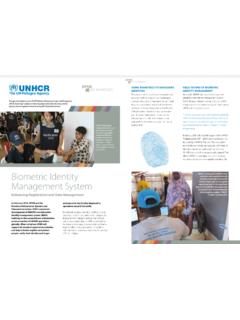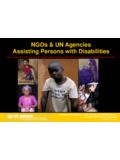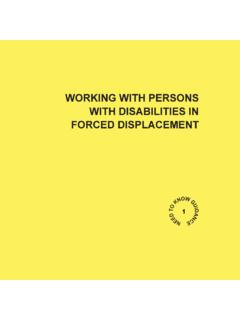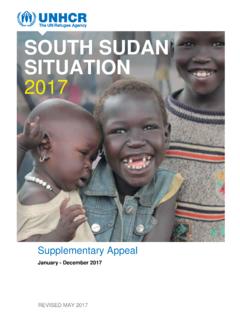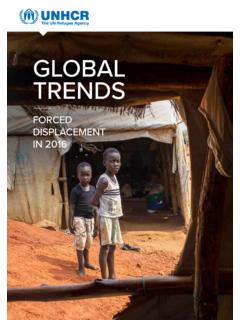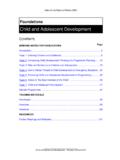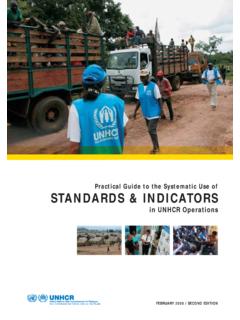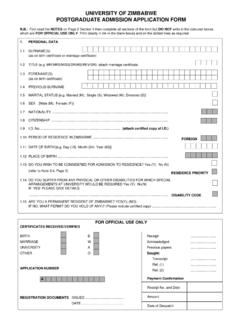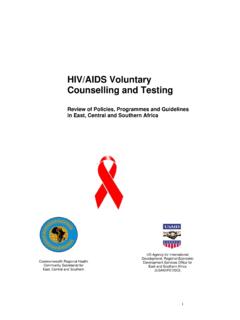Transcription of Asylum Decisions | Immigration Equality
1 Law LibraryImmigration Equality AsylumManualImmigration Law and theTransgender ClientFamily, UnvaluedAsylum DecisionsArticlesLegal BriefsPractice AdvisoriesImEq AdvocacyPrimary Source MaterialsUseful LinksHome / Issues / Law Library / Asylum DecisionsAsylum DecisionsUntil recently, there was very little precedent in the area of LGBT and HIV-based Asylum law. Since2003, the number of precedential LGBT Asylum cases has more than tripled. Not surprisingly, the NinthCircuit has continued to expand Asylum , withholding and CAT protections for LGBT individuals, butother Circuits have taken much narrower views of what constitutes persecution in this is a case chart which combines all precedential and non-precedential decision from federalcourt which is current through May 2010.
2 This chart combines the work of Holland & Knight internNedra Adams, and students at the University of Washington School of Law, Meena Jagannath,Roxanna Rezai and Tobias Damm-Luhr under the supervision of professor Thomas Cobb. Thanks alsoto former Immigration Equality intern, Jessica Jenkins, for her contributions to the chart. Furtherthanks to Melanie Schaschl, Charlotte Melbinger, Maki Takahashi, and Scott Levi of the University ofPennsylvania Law School for their 2012 , every Asylum application is unique and very dependent on the specific facts of the case,so, just because another applicant won (or lost) from a particular country does not mean that anotherapplicant from the same country will have the same PRECEDENTIAL AND NON-PRECEDENTIAL Asylum TABLE CURRENT THROUGHOCTOBER 2012 (pdf)Below you will find links to all of the precedential cases which do exist.
3 If you know of other caseswhich you think we should include here, please let us would also like to expand this area of the website to include unpublished (redacted) BIA andImmigration Court Decisions to aid practitioners in thinking of creative arguments in their Asylum LAW PRECEDENTIAL LGBT/HIV DECISIONSM atter of Toboso-Alfonso 20 I&N Dec. 819 (BIA 1994) (pdf) - ( 1990) the original case,decided in 1990 and designated as precedent in 1994, which established sexual orientation as membership in a particular social group and paved the way for Asylum based on sexual orientation. Toboso-Alfonso was a gay man from Cuba who suffered various abuses at the hands of hisgovernment, including being forced to participate in a labor v.
4 INS, 118 641 (9th Cir. 1997) (pdf) finding that even if the abuser does notintend harm to the victim, if the victim experiences the abuse as harm, this can rise to the level ofpersecution. In this case, the applicant was a lesbian from Russia who, among other abuses, hadbeen forced to undergo electroshock therapy to cure her of her homosexualityHernandez-Montiel v. INS, 225 1088 (9th Cir. 2000) (pdf) finding that a gay man with afemale sexual identity who suffered persecution in Mexico, largely because he was effeminate,qualified for v. Ashcroft, 328 719 (3rd Cir. 2003) (pdf) finding that it is possible to proceed with anasylum claim based on persecution on account of imputed membership in a particular social group, inthis case sexual orientation, even if the applicant is not actually gay.
5 In this case the applicant, a manfrom Ghana who feared he would be ritually sacrificed, engaged in a homosexual act with another man,knowing that this would lead to his being spared the sacrifice. After he was spared, however, he wasmistreated because the authorities believed he was gay. The Court recognized his imputedmembership in a particular social group and remanded the case for further investigation on his claim v. Ashcroft 378 734 (8th Cir. 2004) (pdf) motion to reopen based on fearedpersecution by HIV-positive Ethiopian woman denied becasue she knew of her HIV-positive status atthe time of the original hearing and did not raise the v. Ashcroft, 384 782 (9th Cir. 2004) (pdf) reaffirming that a gay man with aEspa olJoin the fight for lesbian, gay, bisexual andtransgender immigrantsAsylum Decisions | Immigration of 52/25/2013 2:18 PMfemale sexual identity belongs to a particular social group, and finding that if a government willfullyturns a blind eye to severe physical abuse inflicted by non-government actors this can rise to the levelof government acquiescence in torture so as to qualify for relief under the Convention Against Torturetreaty.
6 In this case Reyes-Reyes was a gay man with a female sexual identity from El Salvador whohad been kidnapped, beaten and raped by non-government actors because of his sexual orientation. The Court remanded for further proceedings on his CAT and withholding v. Ashcroft, 390 551 (8th Cir. 2004) (pdf) holding that the federal court lackedjurisdiction to review his claimed exception to the one year filing deadline for Asylum and that Molathwahad failed to demonstrate that it was more likely than not that he would be persecuted because of hisgay sexual orientation in his native v. Ashcroft, 396 446 (1st Cir. 2005) (pdf) denying a gay Guatemalan man s petitionfor review because he failed to show government involvement or lack of protection from pastmistreatment he suffered by his neighborsKarouni v.
7 Gonzales, 399 1163 (pdf) (9th Cir. 2005) (pdf) holding unequivocally that all alienhomosexuals are members of a particular social group and finding that Karouni, a gay HIV positiveman from Lebanon, had established a well founded fear of future v. Gonzales, 418 1082 (9th Cir. 2005) (pdf) holding that a gay Mexican manwith AIDS who was sexually and physically abused by a Mexican police officer was statutorily eligiblefor Asylum . The case also contains good language about the applicant s HIV status making internalrelocation within Mexico impossible, as well as good language that return trips to the home countryalone do not render an applicant ineligible for v. Gonzales, 420 804 (8th Cir. 2005) (pdf) holding that gay man from Peru who didnot personally suffer past persecution and who did not meet a one year filing deadline exception, failedto prove a clear probability of future persecution and therefore did not meet the standard forwithholding of removal.
8 The Court found it significant that Salkeld himself had never experiencedphysical violence, there are no laws against homosexuality in Peru, and there are some regions in Peruwhich are relatively safer for gay people than v. Gonzales, 431 319 (8th Cir. 2005) (pdf) terrible decision (with good dissent)holding that a gay man from Zimbabwe had not established past persecution although, among otherthings, he was jailed without charges for two months after having sex with another man at college. TheCourt found that he was jailed because of sexual misconduct, not homosexual identity. The Court alsofound that in spite of Mugabe s statements that homosexuals have no rights, and Zimbabwe s poorrecord on human rights, that Kimumwe had failed to prove a fear of future Chavez v.
9 Gonzalez, 458 1052 (9th Cir. 2006) (pdf) withholding of Removal andConvention against Torture decision remanding the case of a transgender woman from Mexico whosuffered abuse from family and coworkers, because the Immigration Judge applied an impermissiblystrict legal standard to both claims. The circuit court found that reporting past abuse to police was not arequirement for withholding of removal, and that the legal standard for CAT relief was not that the abusewas sanctioned by government official but that it occurred by their consent or acquiescence or willfulblindness. Joaquin-Porras v. Gonzales, 435 172 (2d. Cir. 2006) (pdf) terrible decision finding that inspite of the clear regulatory language that the one year filing deadline is calculated from the last date ofentry, this applicant who applied within one year of entering the after receiving advance parolewas untimely.
10 Worse still, the 2nd Circuit upholds the immigraiton judge s holding that Joaquin-Porras,a gay man from Costa Rica, did not suffer past persecution when he was raped by a police officer, butrather suffered a random act of violence by a corrupt officer and that an incident during his last visit toCosta Rica during which he was detained by the police and forced to pay a bribe did not rise to thelevel of persecution. This case serves as a cautionary tale that bad facts make bad law. Joaquin-Porras had obtained advance parole through a fraudulent marriage which may have predisposed thecourts against him, and State Department reports for Costa Rica show it to be a more tolerant countrythan others in Latin v. Gonzalez, 472 689 (9th Cir.)

